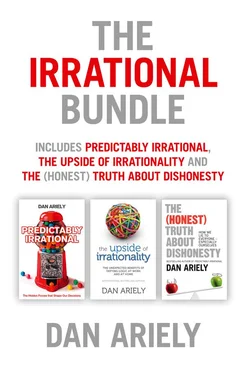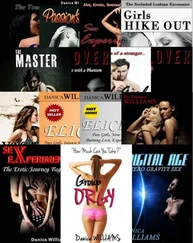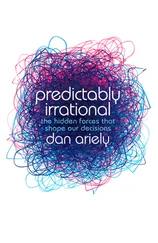Dan Ariely - The Irrational Bundle
Здесь есть возможность читать онлайн «Dan Ariely - The Irrational Bundle» — ознакомительный отрывок электронной книги совершенно бесплатно, а после прочтения отрывка купить полную версию. В некоторых случаях можно слушать аудио, скачать через торрент в формате fb2 и присутствует краткое содержание. Жанр: unrecognised, на английском языке. Описание произведения, (предисловие) а так же отзывы посетителей доступны на портале библиотеки ЛибКат.
- Название:The Irrational Bundle
- Автор:
- Жанр:
- Год:неизвестен
- ISBN:нет данных
- Рейтинг книги:3 / 5. Голосов: 1
-
Избранное:Добавить в избранное
- Отзывы:
-
Ваша оценка:
- 60
- 1
- 2
- 3
- 4
- 5
The Irrational Bundle: краткое содержание, описание и аннотация
Предлагаем к чтению аннотацию, описание, краткое содержание или предисловие (зависит от того, что написал сам автор книги «The Irrational Bundle»). Если вы не нашли необходимую информацию о книге — напишите в комментариях, мы постараемся отыскать её.
The Irrational Bundle — читать онлайн ознакомительный отрывок
Ниже представлен текст книги, разбитый по страницам. Система сохранения места последней прочитанной страницы, позволяет с удобством читать онлайн бесплатно книгу «The Irrational Bundle», без необходимости каждый раз заново искать на чём Вы остановились. Поставьте закладку, и сможете в любой момент перейти на страницу, на которой закончили чтение.
Интервал:
Закладка:
OWNERSHIP IS NOT limited to material things. It can also apply to points of view. Once we take ownership of an idea—whether it’s about politics or sports—what do we do? We love it perhaps more than we should. We prize it more than it is worth. And most frequently, we have trouble letting go of it because we can’t stand the idea of its loss. What are we left with then? An ideology—rigid and unyielding.
THERE IS NO known cure for the ills of ownership. As Adam Smith said, it is woven into our lives. But being aware of it might help. Everywhere around us we see the temptation to improve the quality of our lives by buying a larger home, a second car, a new dishwasher, a lawn mower, and so on. But, once we change our possessions we have a very hard time going back down. As I noted earlier, ownership simply changes our perspective. Suddenly, moving backward to our pre-ownership state is a loss, one that we cannot abide. And so, while moving up in life, we indulge ourselves with the fantasy that we can always ratchet ourselves back if need be; but in reality, we can’t. Downgrading to a smaller home, for instance, is experienced as a loss, it is psychologically painful, and we are willing to make all kinds of sacrifices in order to avoid such losses—even if, in this case, the monthly mortgage sinks our ship.
My own approach is to try to view all transactions (particularly large ones) as if I were a nonowner, putting some distance between myself and the item of interest. In this attempt, I’m not certain if I have achieved the uninterest in material things that is espoused by the Hindu sannyasi, but at least I try to be as Zen as I can about it.
Reflections on the Challenges of Ownership
In 2007 and 2008, home values across America plummeted as fast as George W. Bush’s approval ratings. Each month brought with it more bad news: more foreclosures, more new homes for sale in a stagnant real estate market, and more stories of people who couldn’t get mortgages. Results from a study by Zillow.com (a Web site that facilitates home searches and price estimations) illustrated just how strongly this news affected home owners: in the second quarter of 2008, nine out of ten home owners (92 percent) said there had been foreclosures in their local real estate market, and they were concerned that these foreclosures had lowered home values in their neighborhoods. Moreover, four in five home owners (82 percent) did not see much hope for improvement in the real estate market in the near future.
On the face of it, Zillow’s research suggested that homeowners had been paying attention to the media, had an idea of what was happening in the economy, and understood that the housing crunch was a reality. But this study also found that these seemingly well-informed people believed that the values of their own homes had not decreased as much. Two out of three home owners (62 percent) believed that the value of their own home had increased or stayed the same, and about half (56 percent) planned to invest in home improvements, even as they watched the housing market collapse around them. What explained the wide gap between their inflated perception of their homes’ values and the gloomy market reality?
As we discussed in Chapter 8, ownership fundamentally changes our perspective. In the same way that we think our own kids are more wonderful and special than our friends’ and neighbors’ children (regardless of whether our children deserve such esteem), we overvalue everything that we own, whether it’s a pair of basketball tickets or our domiciles.
But home ownership is even more interesting and complex than, say, the regular case of owning a coffee mug or a pair of baseball tickets—because we invest so much in our houses. Think, for example, about all the changes and tinkering we do to our homes once we move into them. We replace laminate countertops with granite. We take out a wall and install a new window that lets the light shine just so on the dining room table. We paint the living room walls a deep earthy clay color. We change the bathroom tile. We add a porch and install a koi pond in the backyard. Little by little, we make changes here and there until the house feels perfectly tailored to our unique individual tastes, until it expresses our elegant or eclectic sense of style to everyone else. When the neighbors come over, they admire our countertops and light fixtures. But in the end, do other people value the changes we have so lovingly made as much as we do? Do they value these changes at all?
Consider a home owner who compares her own beautifully remodeled house with a similar one down the street that has been languishing on the market for months, or with another that has recently sold for much less than the asking price. In so doing, she understands why the owners of these other homes had such a hard time selling them. They had the laminate and not the granite countertops, no earthy clay paint or light that fell just so on the dining room table. “No wonder those houses didn’t sell,” she thinks to herself, “they simply are not as nice as mine.”
MY WIFE, SUMI, and I also fell victim to this bias. When we worked at MIT, we bought a new house in Cambridge, Massachusetts (the house was originally built in 1890, but it felt new to us). We promptly went about fixing it up. We took down some walls to give the house an open feel, which we loved. We renovated the bathrooms and set up a sauna in the basement. We also converted the carriage house in the garden into a small combination office-apartment. Sometimes we would pack our laundry basket with some wine, food, and clothing, and escape to the carriage house for a “weekend away.”
Then, in 2007, we took jobs at Duke University and moved to Durham, North Carolina. We assumed that the housing market would continue to decline, and that it would be in our best interest to sell the Cambridge house as quickly as possible. We also wanted to avoid having to pay for heating, taxes, and a mortgage on two homes.
Many people came to see our beautifully remodeled Cambridge home. They all seemed to appreciate the structure and the feel of the place, but no one put in an offer. People told
us that the house was beautiful, but somehow they could not fully appreciate the benefit of the open floor plan. Instead, they wanted something with more privacy. We heard what they said, but it didn’t fully register. “Clearly,” we said to each other after each set of prospective buyers had come and gone, “those people are just dull and unimaginative, and have no taste. Surely our beautiful, open, airy home will be just right for the perfect someone.”
Time passed. We paid double mortgages, double heating bills, and double taxes while the housing market continued to slow down. Many more people came to see the house and left without extending an offer. Eventually Jean, our real estate agent, delivered the bad news to us the way a doctor tells a patient there’s something funny looking on his X-ray. “I think,” she said slowly, “that if you want to sell the house, you will have to rebuild some walls and reverse some of the changes you have made.” Until she said those words, we had not accepted this truth. Despite our disbelief, and still fully convinced of our superior taste, we took the plunge and paid a contractor to re-erect some walls. A few weeks later the house was sold.
In the end, the buyers didn’t want our home. They wanted theirs. This was a very expensive lesson, and I certainly wish we had had a better sense of the effect of our modifications on potential buyers.
OUR PROPENSITY TO overvalue what we own is a basic human bias, and it reflects a more general tendency to fall in love with, and be overly optimistic about, anything that has to do with ourselves. Think about it—don’t you feel that you are a better-than-average driver, are more likely to be able to afford retirement, and are less likely to suffer from high cholesterol, get a divorce, or get a parking ticket if you overstay your meter by a few minutes? This positivity bias, as psychologists call it, has another name: “The Lake Wobegone Effect,” named after the fictional town in Garrison Keillor’s popular radio series A Prairie Home Companion. In Lake Wobegone, according to Keillor, “all the women are strong, all the men are good-looking, and all the children are above average.”
Читать дальшеИнтервал:
Закладка:
Похожие книги на «The Irrational Bundle»
Представляем Вашему вниманию похожие книги на «The Irrational Bundle» списком для выбора. Мы отобрали схожую по названию и смыслу литературу в надежде предоставить читателям больше вариантов отыскать новые, интересные, ещё непрочитанные произведения.
Обсуждение, отзывы о книге «The Irrational Bundle» и просто собственные мнения читателей. Оставьте ваши комментарии, напишите, что Вы думаете о произведении, его смысле или главных героях. Укажите что конкретно понравилось, а что нет, и почему Вы так считаете.












